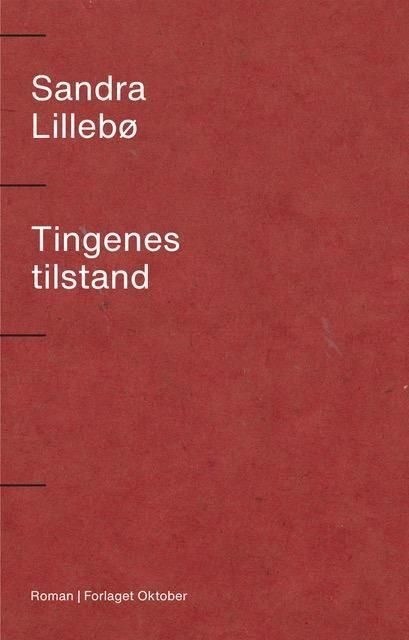“The author has an extraordinary gift for striking phrases and precise images that never feels forced or strained. This makes for a wonderful read despite the sinister theme. Still, it’s the author’s ability to reflect, combined with the personal and artistic necessity pervading this work, that makes The State of Things so successful”
Bjørnson Endowment 2021, jury statement
“The State of Things is one of the books of the year because Lillebø is absolutely merciless and full of mercy at the same time. She switches between brutal certainty and disintegrated vulnerability … She writes to avoid going to pieces, she writes to survive. There’s a valid objection to a lot of contemporary Norwegian literature that there is little at stake. That objection bounces off Sandra Lillebø.”
Oslo Prize 2020 Nomination, jury statement
“A wise and self-critical autofictional novel about confronting one’s mother … This is both a testimony that proves its worth through its honesty and a fragmentary poetics that stands out for the thoroughness in its deliberations on what literature can and should be used for”
Information, Denmark
“That growing up in a dysfunctional family can make you ill, is something we have read a lot about in Norwegian literature. But how a fractured life can be healed by writing your story, has hardly been told as convincingly as Sandra Lillebø does. In sober, but intense rose she manages to show what’s at stake for the main character: To become yourself”
Valborg O. Stene, Vårt Land, Best of 2020“
A powerful novel about living with a mentally ill mother … Lillebø has a fantastic ability to portray feelings … The content makes a powerful impression, but the quality of its literary form justifies her description of reality. She is one of our new literary stars»
Adresseavisen, 5/6 stars
“A masterful, captivating novel … Through sharply articulated insights, the novel’s narrator exposes the family she comes from … ‘Other families opened their windows to get some air. We got rid of the entire house’. With these astonishing words, Lillebø brilliantly portrays the dramatic, harrowing pattern of the narrator’s childhood and youth”
Klassekampen
“A refreshingly raw [novel] …The novel is a powerful read, all the way through. It’s not only powerful on an emotional level, it’s also wise in a way that strengthens me as a reader … it makes me want to learn a lot more, and I want to listen to everything the author is saying. Because Lillebø has so much to offer, not only in the relationship to her mother, but also when it comes to writing and literature … and the ending is also incredibly beautiful. I get the feeling that there’s a long and strenuous process behind this novel, at the same time as it’s written out of necessity”
Dagbladet, 5/6 stars
“An unusually honest, personal and unfiltered text about living with a mentally ill mother – and living without her … That’s exactly what this novel felt like: As an absolutely necessary novel … Uplifting? No. But worth it? Yes»
NRK BOK
“Lillebø’s remarkable debut novel explores the complicated relationship between a daughter and her mentally ill mother … The State of Things is a novel written out of great necessity and with deep literary seriousness … The text is full of striking insights and thoughts about language and the significance of writing. It’s a long time since I read a novel that was so quotable, that opens such important discussions and further reflection”
VG, 5/6 stars
“A powerful and at times heartbreaking story of growing up with a mother with serious mental illness in the Norwegian lower class … Not since Olaug Nilssen’s Tung tids tale (2017) have I read a book that in such an intensely gripping, sorrowful, angry, shameful and direct way explores the pain of having to save yourself at the expense of someone you love.”
Aftenposten
“I turn the pages, reading quickly, as if it were a crime novel, even though this is heavily charged, advanced prose. For Lillebø has the ability to grab the reader with a single sentence … This novel has the best qualities of poetry and the best of journalisism … This is without a doubt an important book. The narrator gives voice to an experience that many people share, but which very few can articulate”
Romsdals Budstikke
“Lillebø’s prose is clear and sharp … It is a novel that will shake the reader, no matter what kind of wounds or expectations one approaches this novel with”
Bok365
“Some books are written out of a greater necessity than others … The inevitability and acuteness of the liberation process in this novel is what makes it so convincing … She sees that her mother is in pain, but she can’t walk any further with her. With moral reflections like this, this powerful text opens up room for many thoughts in the reader”
Vårt Land

